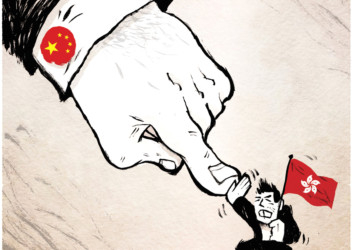
In the global war of ideology that US President Barack Obama says is not happening, Hong Kong is on the front lines.
Democracy in Hong Kong is increasingly squeezed by the autocrats of Beijing. It is a fight of ideas and power, but also of flesh and blood: Just ask truth-telling newspaper editor Kevin Lau Chun-to, who was savagely assaulted and nearly killed in February in what he believes was an attack on his journalism.
Two of the most stalwart fighters on the side of democracy were in Washington last week, hoping for moral support. They made for an odd couple, though each has spent more than 40 years in the struggle: one is a consummate insider and the other has always battled from the outside.
The latter, lawyer Martin Lee, fought the British for more autonomy when they ruled Hong Kong. Since the British left in 1997, he has pressed Beijing to keep its word to allow Hong Kong to preserve its separate system of governance within China — the formula known as “one country, two systems”.
Anson Chan, by contrast, rose through the prestigious Hong Kong civil service to the top appointed position of chief secretary, resigning in 2001 when she felt the chief executive was allowing Beijing to chip away at Hong Kong’s core values: rule of law, a level playing field and freedom of press, speech and association. Since then, she said, democracy’s hold has grown more precarious — “I’m quite frankly surprised at the rate of deterioration,” she said during a visit to The Washington Post — and she is hoping the United States will speak out.
Will it? Obama recently told an audience in Brussels that, though the future belongs to those who support freedom and democracy, “those rules are not self-executing” and “the contest of ideas continues for your generation”.
Yet he also insisted that there is no new Cold War. “After all,” he said, “unlike the Soviet Union, Russia leads no bloc of nations, no global ideology.”
It’s true that “anti-freedom” doesn’t sound like an ideology to most Americans. The tyrants who hung on after the Soviet Union collapsed in 1991 at first pretended to no rationale beyond, well, hanging on.
But the dictators of Russia and China today are making a bid for legitimacy as well as survival.
They present themselves as guarantors of stability, warding off the confusion and insecurity that follow democratic uprisings. They boast of investing in the future — in highways and fast trains — in ways that pandering elected officials in India or the United States cannot manage. They put their systems forward as an antidote to the empty materialism of capitalist democracies — the pornography, the hedonism, the lack of respect for elders and religious leaders. They claim to stand for community, spirituality and tradition.
No doubt ex-KGB agent Vladimir Putin came to his philosophy rather late, after democratic protests in 2011 began to undermine his kleptocratic rule. Similarly, the Communist Party barons in Beijing grew especially attuned to the evils of a free press when it began reporting on their own secreted billions.
But whether the leaders believe in their stew of xenophobia, phoney egalitarianism and traditional (Russian Orthodox or Confucian) values hardly matters. They are fighting a new Cold War against democracy, and the other side is only intermittently on the field.
And Russia and China fight with particular intensity on or near their home turf. Putin cannot abide democracy in Ukraine because the example to Ukraine’s Slavic brothers next door would present a mortal threat. Chinese leaders know that the values that have made Hong Kong successful — transparency, accountability — are precisely what middle-class Chinese are beginning to clamour for at home.
So in 2017, when Hong Kong is finally supposed to freely elect its chief executive, democracy advocates fear that Communist leaders will find a way to control the field of candidates — to allow a choice between “Puppet A or Puppet B,” as Lee told me.
Meanwhile press freedom shrinks, not only because of physical attacks such as those on Lau but also as businesses feel pressure not to advertise in independent media.
Lee and Chan want a more open political process. Chan said it would produce a chief executive who would still want to get along with the mainland but who also would stand up for democratic values. She said that how much the United States and other nations seem to care will shape Beijing’s approach to the 2017 election rules.
“Their minds are not made up,” she said. “They are always watching what the rest of the world does.”
“We are not asking for a lot,” Lee added. “We are not asking you to send armies. Just say, ‘Please, you promised to give Hong Kong democracy, please keep your promise.’ This is make or break for us.”
— Washington Post










